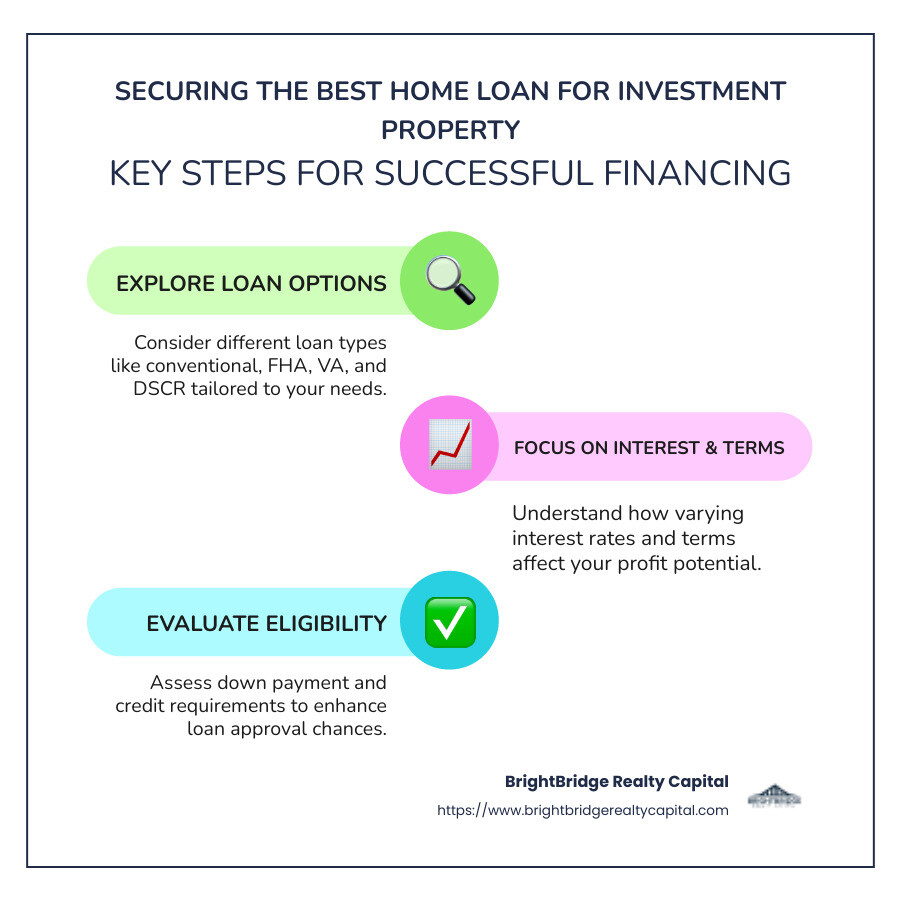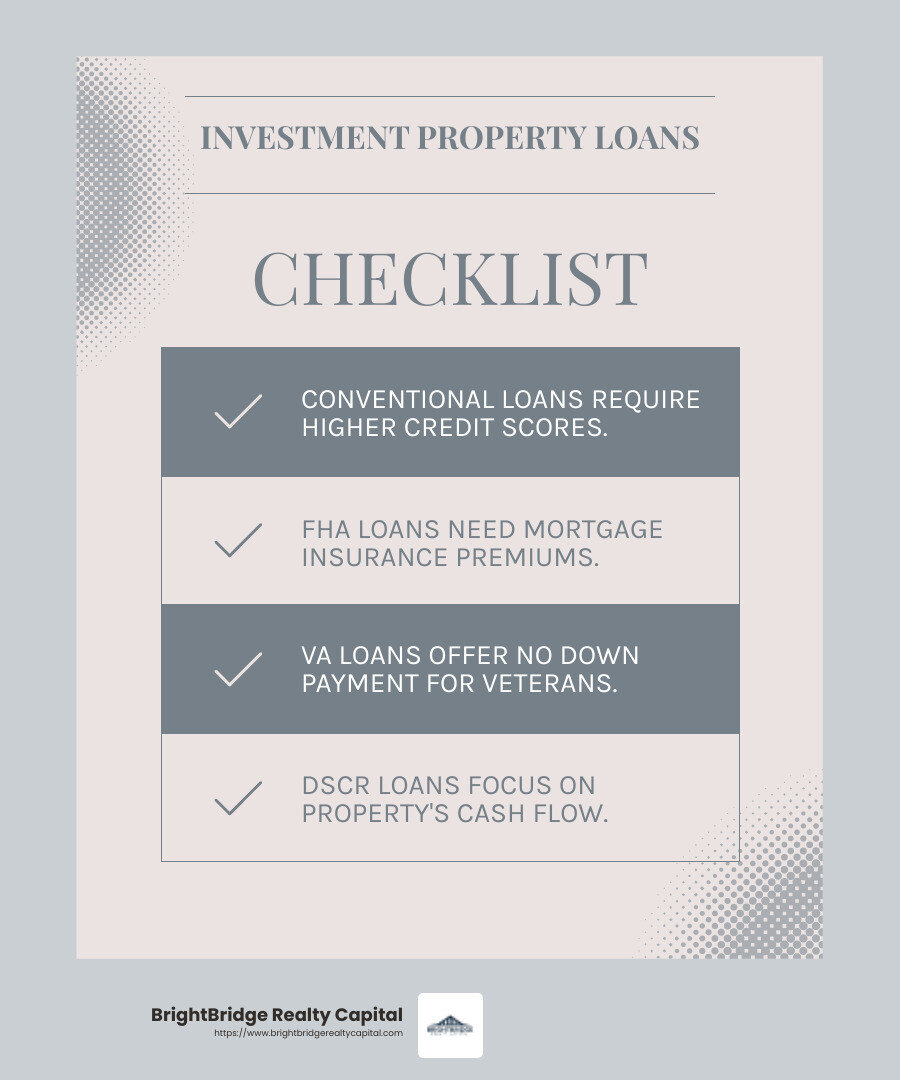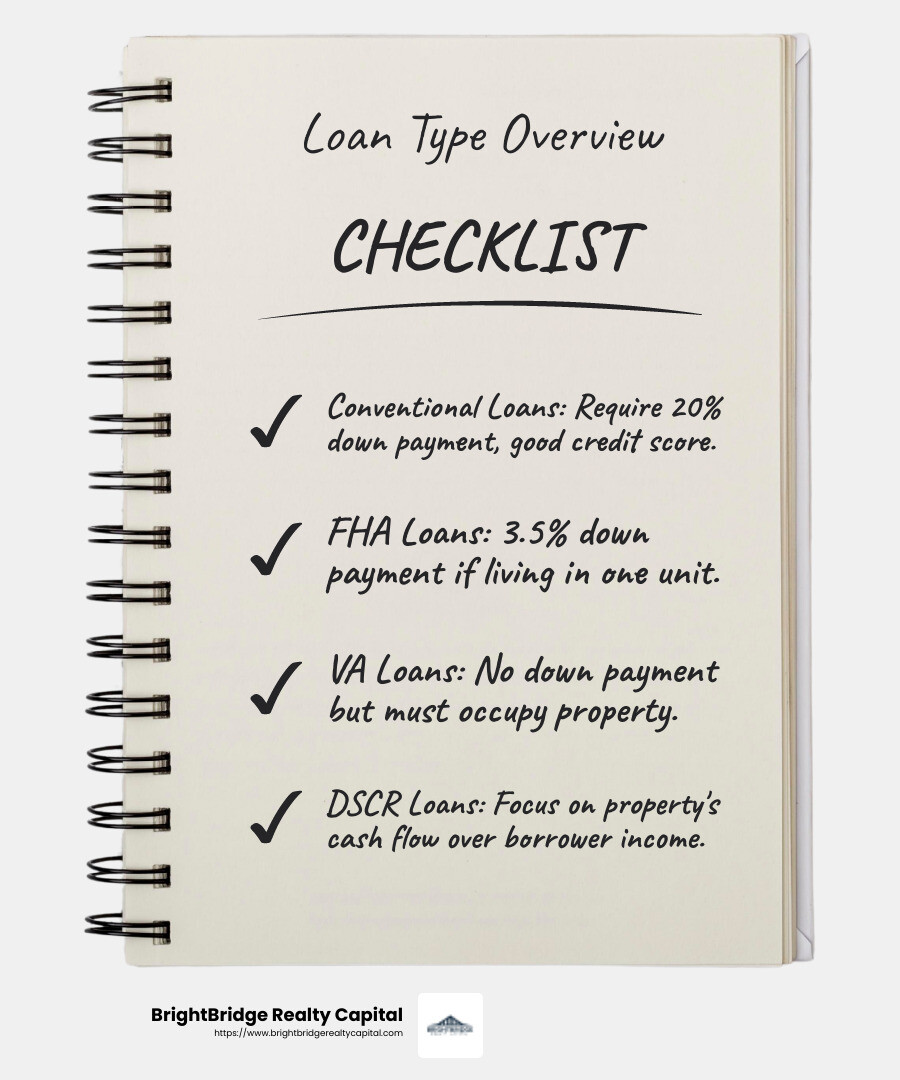Unlocking the Best Home Loan for Your Investment Property

Open uping the Best Home Loan for Your Investment Property
Finding the best home loan for investment property is crucial for any real estate investor looking to expand their rental portfolio or start on lucrative fix-and-flip projects. With the right financing, you can leverage opportunities to improve your returns and build wealth.
Here's what you need to know about securing optimal financing:
1. Explore Diverse Loan Options: Consider conventional loans, FHA, VA, or DSCR loans depending on your specific needs.
2. Focus on Interest Rates and Terms: These can vary significantly, impacting your long-term profitability.
3. Evaluate Down Payments and Credit Requirements: These factors influence your loan eligibility and conditions.
Real estate investing is not just about choosing the right property—it's also about securing a loan that aligns with your investment strategy. Whether you're a seasoned investor or just starting out, understanding the intricate landscape of financing can make the difference between simply maintaining and significantly growing your investment portfolio.

Quick best home loan for investment property definitions:
- conventional loan for investment property
- fannie mae loan for rental property
- mortgage loan for investment property
Understanding Investment Property Loans
When diving into real estate investments, understanding the different types of loans available is crucial. Each loan type comes with its own set of requirements and benefits, impacting your investment strategy and financial outcomes.
Loan Types
Conventional Loans are the go-to for many investors. They typically require a higher credit score and larger down payment compared to loans for primary residences. These loans have fixed or adjustable interest rates and are suitable for those with solid credit histories.
FHA Loans, while primarily designed for primary residences, can be used to purchase multi-unit properties if you live in one of the units. They offer lower down payments but require mortgage insurance premiums.
VA Loans are available to veterans and active military members. They offer the advantage of no down payment and competitive interest rates, making them a great option for eligible investors.
DSCR Loans (Debt Service Coverage Ratio) are custom for investment properties. They focus on the property's cash flow rather than the borrower's income, making them attractive for those with multiple investments.
Down Payment
The down payment for an investment property is generally higher than for a primary residence. Expect to pay at least 20% to 25% of the property's price. A larger down payment reduces the loan amount and can lead to better interest rates.
Interest Rates
Interest rates for investment properties are typically higher than those for primary residences. This is due to the perceived higher risk of rental properties. Rates can range from 0.5% to 1% more than a primary home loan. 
Credit Score
A strong credit score is essential for securing the best home loan for investment property. Lenders often look for a score of 620 or higher. Improving your credit score can lead to better loan terms and lower interest rates. Consider paying off debt and avoiding new credit inquiries before applying for a loan.
Understanding these elements is key to navigating the investment property loan landscape successfully. By aligning the right loan type with your investment goals, you can optimize your returns and build a robust real estate portfolio.
Best Home Loan for Investment Property
Choosing the best home loan for investment property can significantly impact your investment success. Here's a breakdown of four popular loan types to help you decide:
Conventional Loans
Conventional loans are a common choice for seasoned investors. They require a higher down payment, often 20% or more, and a strong credit score. The benefits? Potentially lower interest rates if you have excellent credit. However, the process involves more paperwork and scrutiny of your financial history.
These loans are flexible, catering to both single-family homes and multi-unit properties. But keep in mind, lenders might limit the number of properties you can finance.
FHA Loans
FHA loans are known for their low down payment requirements, as low as 3.5% with a qualifying credit score. While primarily for primary residences, they can be used for investment if you live in one of the units of a multi-family property. This strategy, often called "house hacking," allows you to rent out other units while living in one.
FHA loans require mortgage insurance premiums, which can increase your monthly payments. They also come with property standards that might be stricter than other loan types.
VA Loans
VA loans offer significant advantages for eligible veterans and active military members. With no down payment required and competitive interest rates, they are attractive for those who qualify. However, VA loans are restricted to primary residences, meaning you must live in one of the units if it's a multi-family property.
VA loans do not require private mortgage insurance, which can save you money over time. They also offer foreclosure protection, providing some peace of mind.
DSCR Loans
DSCR loans focus on the property's cash flow rather than the borrower's income. This makes them appealing for investors with multiple properties or those who want to scale their portfolio quickly. The approval process is faster, with less documentation required compared to conventional loans.
While DSCR loans offer flexibility, they often come with higher interest rates due to the perceived risk. It's crucial to ensure the property's rental income can comfortably cover the loan payments to avoid over-leveraging.

Each loan type has its pros and cons, and the right choice depends on your specific situation and investment goals. Consider your financial standing, property type, and long-term strategy to select the best home loan for investment property that aligns with your needs.
Top Loan Options for Real Estate Investors
When diving into real estate investing, choosing the right loan can make all the difference. Here's a look at some of the top loan options available to investors:
Conventional Mortgage
Conventional mortgages are the go-to for many investors. They offer flexibility for both single-family homes and multi-unit properties. The catch? You'll need a bigger down payment, usually 20% or more, and a strong credit score. This type of loan is ideal if you're looking for potentially lower interest rates and can handle the paperwork and financial scrutiny involved.
Pros:
- Lower interest rates with good credit
- Flexible for different property types
Cons:
- Higher down payment
- Extensive paperwork
FHA Loans
FHA loans are attractive due to their low down payment requirements, sometimes as low as 3.5%. While these loans are primarily for primary residences, there's a clever way to use them for investments: "house hacking." With this strategy, you live in one unit of a multi-family property and rent out the others.
Pros:
- Low down payment
- Accessible for first-time investors
Cons:
- Mortgage insurance premiums
- Strict property standards
VA Loans
VA loans are a fantastic option for eligible veterans and active military members. These loans require no down payment and offer competitive interest rates. However, they are restricted to primary residences. You can still invest by living in one unit of a multi-family property.
Pros:
- No down payment
- No private mortgage insurance
Cons:
- Limited to primary residences
Hard Money Loans
Hard money loans are short-term loans provided by private lenders. They are often used for quick property flips. These loans are based on the property's value rather than the borrower's creditworthiness. While they offer fast access to funds, they come with higher interest rates and shorter repayment periods.
Pros:
- Fast approval and funding
- Flexible terms
Cons:
- High interest rates
- Short loan term
Private Money Loans
Private money loans come from individuals rather than traditional lending institutions. They offer flexibility in terms and conditions, which can be custom to suit both parties' needs. These loans are great for investors with strong personal networks but can strain relationships if not handled carefully.
Pros:
- Flexible terms
- Quick funding
Cons:
- Potential strain on personal relationships
- Varied interest rates
Choosing the right loan depends on your financial situation, investment strategy, and long-term goals. Each option has its unique benefits and drawbacks. Weigh them carefully to find the best fit for your investment journey.
Strategies for Securing the Best Loan
When you're investing in real estate, getting the best home loan for investment property is crucial. Here are some strategies to help you secure the most favorable loan terms.
Credit Score Improvement
A high credit score can open doors to better loan terms. Lenders often look for a score of 620 or higher for investment properties. Here’s how you can boost your score:
- Pay bills on time: Consistent, timely payments can gradually increase your score.
- Reduce debt: Lowering your credit card balances can improve your credit utilization ratio, which is a key factor in your score.
- Check credit reports: Regularly review your reports for errors. If you find any, dispute them to potentially increase your score.
Down Payment Strategies
For investment properties, a larger down payment can be beneficial. Here’s why:
- Lower interest rates: A down payment of 20% or more can sometimes secure better interest rates.
- Reduced risk for lenders: A significant down payment shows lenders you're committed and reduces their risk, which might lead to more favorable loan terms.
Consider saving aggressively or using equity from another property to increase your down payment.
Loan Comparison
Not all loans are created equal. Comparing loans can save you money in the long run. Here’s what to consider:
- Interest Rates: Even a small difference in rates can have a big impact over the life of the loan.
- Loan Terms: Look at the length of the loan. Shorter terms often have lower interest rates but higher monthly payments.
- Fees and Costs: Watch out for hidden fees like origination fees, closing costs, or prepayment penalties.
Tip: Use loan calculators to compare different scenarios and find the best option for your needs.
By improving your credit, planning your down payment, and comparing loan options, you can position yourself to secure the best loan for your investment property.
Next, we'll dive into some frequently asked questions about investment property loans to clear up any lingering doubts.
Frequently Asked Questions about Investment Property Loans
What is the minimum down payment for an investment property?
When purchasing an investment property, the minimum down payment typically starts at 15%, but it can vary based on the type of loan and the lender's requirements. Conventional loans often require at least a 20% down payment. However, some lenders might offer options with lower down payments if certain conditions are met, such as a high credit score or a strong rental income potential.
A larger down payment can also lead to better interest rates and lower monthly payments, making it a smart strategy for securing the best home loan for investment property.
How do interest rates for investment properties compare to primary residences?
Interest rates for investment properties are generally higher than those for primary residences. Lenders consider investment properties riskier because they rely on rental income to cover mortgage payments. As a result, you might see rates that are 0.5% to 1% higher than those for a primary home.
For example, if the average rate for a primary residence is 4%, you might expect an investment property rate to be around 4.5% to 5%. This difference underscores the importance of shopping around and comparing offers to find the most favorable rates.
Can I use an FHA loan for an investment property?
FHA loans are primarily designed for owner-occupied properties, meaning they are not typically used for investment properties. However, there is a workaround for those looking to invest in real estate: purchasing a multi-unit property. The FHA allows you to buy a property with up to four units, provided you live in one unit as your primary residence.
This strategy allows you to leverage the benefits of an FHA loan, such as a low down payment (as low as 3.5%), while also generating rental income from the other units. That you must occupy the property for at least one year to meet FHA requirements.
These FAQs address some common concerns when exploring financing options for investment properties. Understanding these details can help you make informed decisions and steer the complexities of real estate investment financing.
Conclusion
Choosing the best home loan for investment property is a critical step in your real estate investment journey. At BrightBridge Realty Capital, we understand the unique challenges and opportunities that come with financing investment properties. That's why we offer custom solutions designed to meet your specific needs, ensuring that you have the financial backing to seize the right opportunities when they arise.
Our hallmark is fast closings, often within a week, which allows you to act quickly in the competitive real estate market. This speed is crucial when you're facing tight deadlines or trying to secure a property before other investors. By cutting out intermediaries and being a direct lender, we streamline the process, providing you with a seamless experience from start to finish.
Competitive rates are another cornerstone of our service. We offer some of the most attractive rates available, helping you maximize your investment returns. Whether you're looking at conventional mortgages, DSCR loans, or other financing options, our team is here to guide you through the process and ensure you get the best possible terms.
In the changing landscape of real estate investment, having a reliable partner like BrightBridge Realty Capital can make all the difference. With our expertise and commitment to your success, you'll be well-equipped to steer the complexities of investment property financing and achieve your financial goals.
For more information on how we can assist you with your investment property financing needs, visit our BrightBridge Realty Capital service page. Let's work together to turn your real estate aspirations into reality.


